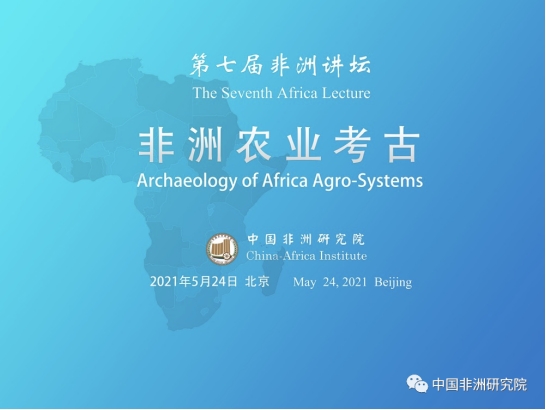
On May 24, 2021, “The Seventh Africa Lecture: Archaeology of Africa Agro-Systems” was held online and off line. The main venue is in China-Africa Institute, Beijing. Professor Augustin Holl was invited to deliver a keynote speech, who is a distinguished scholar and director of the Africa Research Center at Xiamen University and president of the International Scientific Committee for the UNESCO General History of Africa Volume 9-11. Professor Li Xinfeng, the executive president of the CAI made an opening remark. Professor Wang Xiaoming, the vice-president of the CAI presided over the lecture. More than 70 Chinese and African scholars and experts attended the lecture.
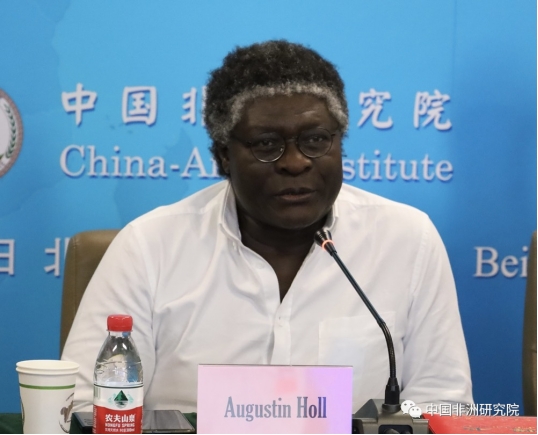
Professor Holl
Professor Holl focused on “Archaeology of Africa Agro-Systems: A Macro Evolutionary Perspective,” and indicated that the equator runs across the African continent, which makes Africa present a unique virtually symmetric distribution of climatic and phytogeographic zones. The diversity of Africa's environment and the transfers of exotic plants and animals to Africa have led to the emergence and evolution of the most diverse agro-systems in the world. Based on macro-evolutionary perspective rationale, the relationship between humans and plants on the African continent has formed complex genealogies. As the foundation of modern societies, livestock husbandry and agriculture emerged at different times and places, in different natural environments and cultural contexts. Professor Holl said: “The adoption and generalization of food-production strategies are the product of macro-evolutionary processes linking many non-linear dynamic systems. They include the complex web of relationship between climate, soils, vegetation, fauna, and human societies. Thanks to the impressive developments of genetics and genomics, plants and animals’ domestication processes can be probed and integrated within a macro-evolutionary framework.” The practice of agriculture emerged comparatively late in Africa where the earliest domesticated crops are the remains of the pearl millet (Pennisetum glaucum) found in Mali’s Tilemsi valley, dating to 4500 BCE. The earliest remains of domesticated sorghum (Sorghum bicolor) have been found in eastern Sudan near Kassala, dating to 3500-3000 BCE, while the earliest remains of domesticated Africa rice (Oriza glaberrima) have been found in the Inland Niger delta, dating to 800 BCE. In contrast, cattle were domesticated in eastern Sahara before 9000 BCE which led to livestock husbandry, and the techniques of animal domestication spread to the mountain areas of the central Sahara. Hunter-gatherer communities in northern and southern Africa adopted a more intensive approach of predation during the latter Pleistocene, and they selectively hunted Barbary sheep in North Africa and Derby's elk in southern Africa by inventing tools such as bows and arrows. Taking the domestication of pearl millet as a case study, Professor Holl explained in details about the domestication process and spread of pearl millet from the macro-evolutionary perspective, and he believed that the domestication of pearl millet originated from the middle and late Holocene pastoral and agro-pastoral systems in Africa. During the Neolithic period, there was a variety of combinations of agriculture and livestock husbandry on the African continent, with strictly agricultural lifestyles concentrated in the humid equatorial regions and exclusively pastoral systems located in the warm and dry regions. Initially, the contractions and expansions of these different food production systems were entirely determined by climate change. But later, with the intercontinental transfers of animal and plant species and the influence of human activities, more diverse combinations of food production systems emerged, resulting in a highly anthropized agricultural landscape.

Professor Li Xinfeng
Professor Li elaborated in his opening remark that the rich natural resources and the diversity of climate conditions make the African continent become one of the origins of human agriculture. He said: “The origin and development of agriculture is not only one of the main achievements in the human history, but also an important symbol of human civilization progress.” Tracing the origin of human agricultural development is significant for humans to better understand the origin of life and the background of human social transformation and productive economic progress. The domestication of animals and plants promoted the rise of agricultural civilization and made important contributions to the development of human society to a higher level. From hunter-gatherer economy to agriculture and animal husbandry, human beings have accumulated rich experience in those areas for millions of years. The progress and development of agricultural technology have laid a solid material and economic foundation for the evolution of human social organization, and have written a magnificent chapter for the evolution of human history. To promote the academic research and cultural exchanges between China and Africa in the areas of archaeology is not only a good way to understand the African history and enhance mutual learning between civilizations, but also a driving force for the progress of modern agriculture and food security in Africa, and a bond for the development of China-Africa cooperation in priority areas.
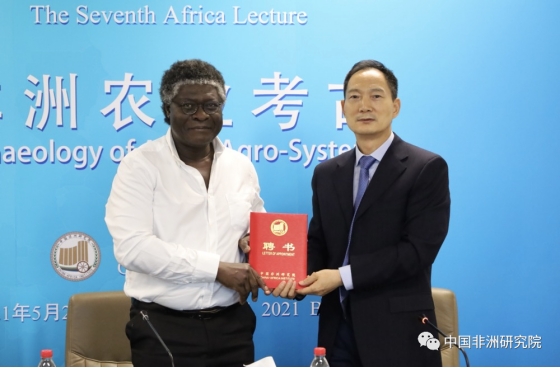
Professor Li, on behalf of the CAI, gave a letter of appointment to Professor Holl as a counselor of the Consultative Committee of the CAI
Before the keynote speech was delivered, Professor Li, on behalf of the CAI, gave a letter of appointment to Professor Holl as a counselor of the Consultative Committee of the CAI.
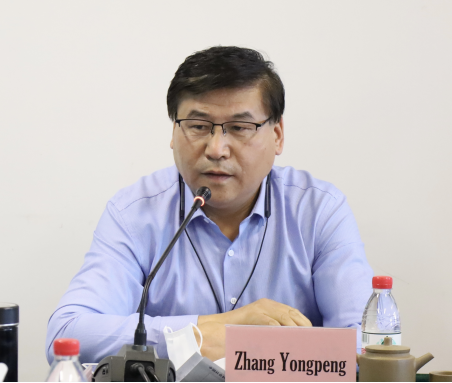
Professor Zhang Yongpeng
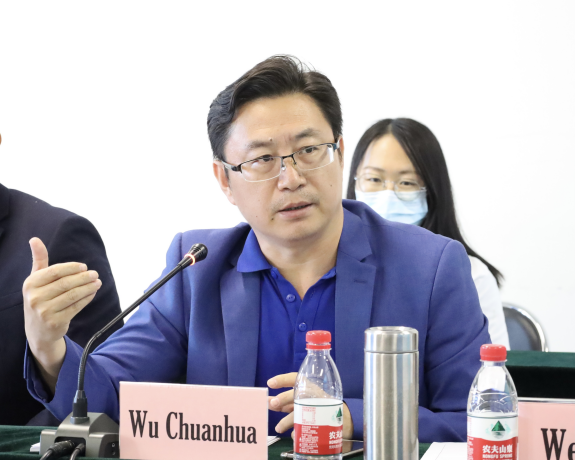
Professor Wu Chuanhua

Professor Pan Huaqiong
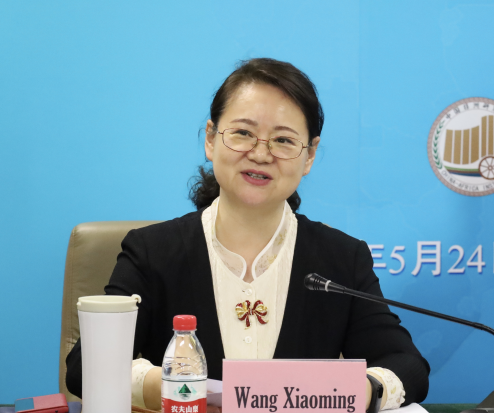
Professor Wang Xiaoming
Zhang Yongpeng, a senior research fellow from the Department of International Relations of the CAI, Wu Chuanhua, a director of the Editorial Department of the Journal of China-Africa Studies and research fellow of the CAI, and Pan Huaqiong, an associate professor from the Department of History at Peking University interacted with the lecturer in Q&A regarding topics of agricultural culture, climate changes, spread of crops, modern archaeology’s impacts on traditional herdsmen and population growth in Africa. Professor Wang concluded that this lecture was based on systematic methodologies, unique perspectives and profound analysis. She emphasized that Professor Holl’s excellent speech not only showed a landscape of how the domestication of animals and plants through the Neolithization Processes made great contributions to the development of agriculture and the progress of human societies, inspired the audiences to think about how to solve the issues of climate changes and food security by ancient wisdom, but also defined a research direction for the mutual learning between civilizations and people-to-people exchanges between China and Africa.
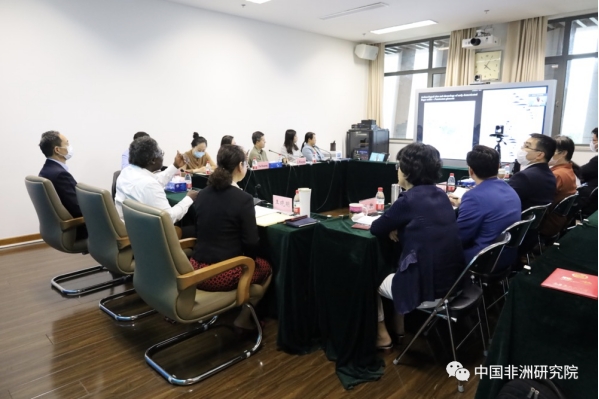
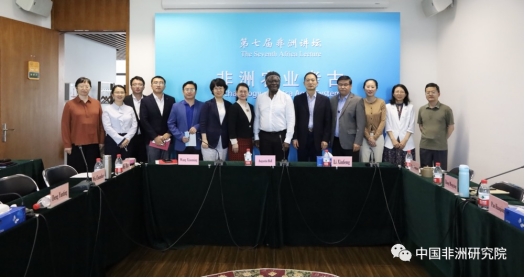
Main venue of the lecture
Address : 1 North National Stadium Road, Chaoyang District, Beijing Post Code : 100007 Tel. : +86 10 87421055 Fax : +86 10 87421046 E-mail : P.O. Box 1120, Beijing
 China-Africa Institute
China-Africa Institute
 Journal of China- Africa Studies
Journal of China- Africa Studies
 West Asia and Africa
West Asia and Africa
